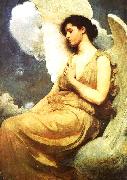Wholesale Oil Painting No Minimum |
|||||||||||
|
|
|||||||||||

|
|||||||||||
|
|
|
||||||||
Abbot H Thayer1849-1921 Abbot H Thayer Galleries Abbott Handerson Thayer (August 12, 1849 ?C May 29, 1921) was an American artist, naturalist and teacher. As a painter of portraits, figures, animals and landscapes, he enjoyed a certain prominence during his lifetime, as shown by the fact that his paintings are in the most important U.S. art collections. In the last third of his life, he worked together with his son, Gerald Handerson Thayer, on a major book about protective coloration in nature, titled Concealing Coloration in the Animal Kingdom: An Exposition of the Laws of Disguise Through Color and Pattern; Being a Summary of Abbott H. Thayer??s Disclosures. First published by Macmillan in 1909, then reissued in 1918, it had a widespread impact on the use of military camouflage during World War I. He also influenced American art through his efforts as a teacher, taking on apprentices in his New Hampshire studio. |
||||||||
|
|
||||||||
Winged Figure
Winged Figure Painting ID:: 4552 |
1889
Art Institute of Chicago 1889 Art Institute of Chicago |
|||||||
|
|
||||||||
|
Abbott Handerson Thayer American Painter, 1849-1921 American painter and naturalist. He spent his youth in rural New England, where his earliest paintings were wildlife subjects, reflecting his interest in hunting and fishing. While in his teens Thayer achieved some success doing portraits of family pets, which he continued after a move to New York. He attended classes at the Brooklyn Art School and National Academy of Design, but in 1875 he settled in Paris, studying under Henri Lehmann and Jean-L?on G?r?me at the Ecole des Beaux-Arts. While abroad he produced landscapes in the Barbizon style and genre scenes, but on his return to New York in 1879 Winged Figure nn09 1889 Oil on canvas 131x96cm |
||||||||
|
|
||||||||
|
Prev Next
|
||||||||
|
|
||||||||
|
Related Paintings to Abbott Handerson Thayer :. |
||||||||
|
|
||||||||
|
CONTACT US |

